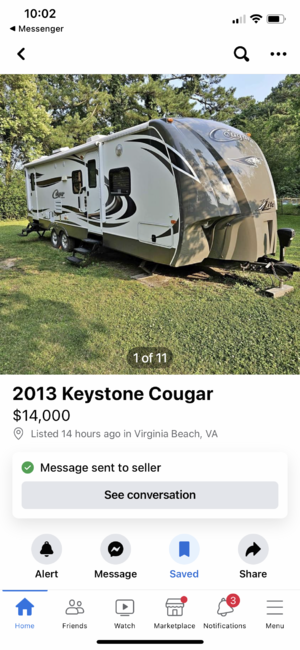"EZ"
Internet Forum Junkie since there was dial up!
- Joined
- Sep 21, 2020
- Messages
- 2,163
- Location
- Ringgold, GA.
- RV Year
- 2006
- RV Make
- Holiday Rambler
- RV Model
- Ambassador
- RV Length
- 40'
- TOW/TOAD
- 2019 Jeep Grand Cherokee
My biggest point I guess was that you really have to do your own research, like you said. Unfortunately you have to buy trucks to tow your RV from a CAR dealership. Most of the CAR salesmen don't know what they are talking about when it comes to the larger 2500/3500/4500/5500 trucks because they haven't been trained BUT they are allowed to sell them.EZ,
In my limited experience, and watching those far wiser then I'll ever be, I've learned never to take any advice (free or paid), "expert analysis" or friendly suggestions as Ex cathedra. Ultimately, I'm responsible for the safety and well being of my family, and so I verify and bumble through any specs or claims with that in mind. Thanks for reinforcing that with your.... well, something similar to empathy, but in relation to safety and well being. Once I pick some contenders I'll update the spreadsheet and add to the thread, all you smarter fellas can comment and newer folks can learn from my mistakes.
I was a Commercial Truck Manager at a dealership in Chattanooga and saw it first hand. The CAR Sales Managers didn't get paid on what I sold but they got paid on everything the CAR salesmen sold. So, when YOU would wander in to buy a new Ram 3500 diesel to pull your new 41' 5th wheel RV do you think they came to get the Commercial Truck Manager that had actually been trained and had spend 25 years selling trucks to help the TRUCK customer??? Heck no!! The Car Sales Manager wanted to get paid so he sent one of his CAR salesmen out to greet you and fake his way through all your questions pertaining to towing.
This same CAR Sales Manager is also the one ORDERING the trucks at most delaerships. He doesn't understand everything he needs to know to order the right packages to get the max towing that Ram is claiming on TV. That's why the article I referenced said that if you just pick any random truck on the lot chances are it isn't spec'd properly for the ratings on the door for towing. It's the same at Ford and Chevy too so don't think it's only the Ram dealers. If you add to this the well intentioned "advice" from the internet you really do have to be careful or you'll spend a lot of hard earned money on a truck that won't do the job or will barely do the job but be unsafe doing it.
Arm yourself with data from the MANUFACTURER. Ram has a great tool where you can build the right truck for your application. You can then print out the spec's and take them to the dealer to compare to what he has on the lot or to use to order what you want. I highly recommend using this tool so you can bypass all the CAR Salesmen BS at the dealership. Check it out here.......Build & Price Your New Ram Vehicle | Ram (ramtrucks.com)
Let me know if I can help. I actually left the CAR dealershipforthe reasons I stated above (and others) and went to work for a Ram Commercial Truck bailment pool and body company in Atlanta. I sell the commercial trucks TO THE RAM DEALERSHIPS all over the Southeast now. I spec the trucks out properly for the application and provide the bodies for the larger chassis up to 5500. I order the trucks so they don't have to. This way they are spec'd properly whether it's a dump truck or a service body truck. A large portion of what we sell are trucks for gooseneck and 5th wheel towing. Unfortunately it's not the pickup trucks that most RV owners need for towing their RV's. Those are still ordered by the Car Sales Manager who knows very little about truck towing. He's more concerned about making sure it has the 12" screened radio and the heated seats. lol.













